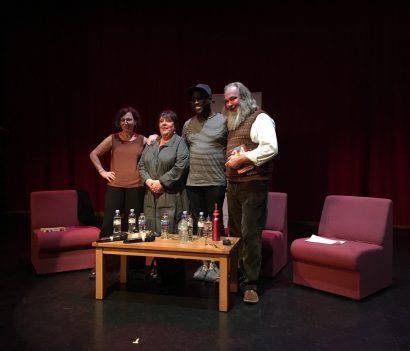 MLF Chapter & Verse
MLF Chapter & Verse
The Manchester Literature Festival Blog
Review: 24 Stories
Centre for New Writing student David Adamson finds hope in stories for Grenfell.
When catastrophes such as the Grenfell Tower fire happen, in the aftermath news reports tend to describe them as ‘an unspeakable tragedy’. While that adjective is fitting in regards to the trauma of the affected and the difficulty in describing such horror, there comes a time when it’s good to talk.
Although the tower has become a tragic symbol of government apathy at local and national level, the dogged and compassionate voices that have continued to be heard in the public sphere have comprised the only positive in the wake of the fire. Some of those voices were at full volume tonight in 24 Stories, held at The Dancehouse Theatre on Oxford Road.
“It’s sad what we’re raising money for, we didn’t want the book to be sad” said Kathy Burke in the introductory chat with John Mitchinson, co-founder of Unbound and chair of tonight’s discussion. This was immediately clear on hearing the stories read by tonight’s guests, all converging on the twin themes of the anthology 24 Stories; hope and community. Of the four stories read aloud on stage tonight, none made mention of the inferno, instead focusing thematically on what we hope to see in the years that follow; acts of community and kindness.
The first story, read by Burke, was The Free Skater by Susan E Barsby. A simple and serene tale of an old man’s attempts to learn ice-skating, it also spoke of the need for quiet calm in amongst the noise urban life often brings. Although, as said, none of the stories focused on the fire, it was this one in particular, and the image of the man’s “skates cutting through the silence, and the cold night air against his face” which was contrasted in my mind with the seared image of the tower. Such opportunities for brief inner peace seem rare in city life, and especially now in the city of London, but this story emphasised for me the need for meditation, perseverance and the relishing of simple things.
One of the two contributing writers present tonight (along with people’s favourite Mike Gayle) was Nina Stibbe, who read her autobiographical story The Language of Flowers, a wonderfully arch tale about the suspicions and presumptions of a rural suburban community, and how an apparent act of kindness (giving someone flowers) can be interpreted in myriad ways. The back-handed bouquets given to the newly-moved (and newly single-parent) Stibbes family can’t not be seen in ironic contrast to the robust and frank communities that Grenfell symbolises. Burke encapsulated this by stating that new families on estates were often given biscuits, and it’s hard to read into a pack of digestives. The Language of Flowers is a good representative of the character of the anthology itself; although its intention is to raise money for those affected by a terrible tragedy, it need not mean that the stories themselves deal in terrible tragedy. They are, in the simplest terms, greatly enjoyable stories and an honourable way to help those in need.
Another of these tales, The Good Sandyman by Mike Gayle, touches lightly on the political undercurrent many felt at the heart of the disaster and its aftermath; of people existing 1km from each other yet living in seperate worlds. This is seen through the adventure of Tyson, a young black boy from the local estate who, en route to visiting AJ for an hour on their bikes, encounters an old man lying helpless in the garden of his “house with two bay windows and a double garage”. Taught the fable of the Good Samaritan at school and seeing an opportunity to enact it himself, he eventually thaws the frosty rejections of the old man (“the day I take help off someone like you”) and a connection is made. This theme of connection was at the heart of the final story of the evening, read by Burke, We Have Now by Kat Day, and confirmed a credo that should be carried forward; connect with each other.
Burke mentioned in the final minutes how the instigator and chief editor of this collection, Rhona Martin (herself an open sufferer of PTSD) spoke of the need to help survivors with “the rest of their lives”, not just the next month. As anyone who has read and cherished a story for decades will know, they can bring great comfort and hope for years to come, and tonight showed that whatever happens to us, the best antidote is human connection and hope.
